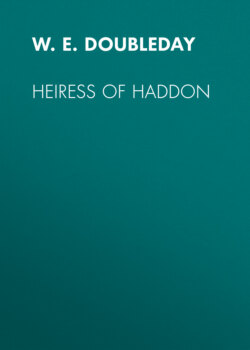Читать книгу Heiress of Haddon - W. E. Doubleday - Страница 22
На сайте Литреса книга снята с продажи.
REVENGE!
ОглавлениеHe laid the body in the grave, and put some plants upon the top, and then, after watering them with the tears which copiously ran down his cheeks, he turned his back on Haddon, and started for Nottingham with few regrets, leaving behind him little enough to love, and much to be revenged.
Footsore and weary he hastened to the Chapel Bar, glad indeed to find himself so near the end of his journey; but before he had quite reached it he had the mortification to hear the sound of the closing bell, and when he arrived there the gates were shut.
"Ho, ho, there, porter!" he cried, and he violently kicked the iron post by way of emphasis to the call.
"Aye, aye, there; steady now, thou'rt over late," replied the burly porter as he tantalisingly rattled the heavy keys in his hand.
"Yes, but only a minute," Edmund replied; "you can let me in, and you will."
"Nay, master, not till next sunrise," he returned. Edmund groaned.
"But I cannot stay outside all night," he said. "Come, open the gate, there's a good fellow."
"I were like to lose my position if I did," answered the other. "I cannot unless—," and he significantly jingled some coins in his pocket.
"Unless what?"
The gatekeeper thought Edmund Wynne uncommonly dull of comprehension, and with a little hesitation he suggested that it were surely worth a trifle if he did break through the rule.
"Here, here's a groat then," exclaimed the smith, bringing out his last coin as he saw the other moving away.
"Pooh, a sorry groat!" said the keeper, "Make it two, and then!"
"But I must get in to-night," expostulated Edmund, "I have urgent business with Sir Ronald Bury. It is important, it is a matter of the State."
At the mention of Sir Ronald's name the key was inserted in the lock, and by the time the sentence was completed the great gate was swung open, and the visitor found himself, to his great satisfaction, beyond the barrier.
"I was but jesting," humbly said the man as he re-locked the gate; "for you must well know that we are not allowed to take bribes, though where the harm of it would be, I confess I cannot see."
Having succeeded in passing the barrier, Edmund did not stay to argue the question with the gatekeeper. He turned his steps towards the Castle, and in a very few minutes found himself at its embattled entrance.
The gates, of course, were fastened, but the bell-rope was hanging down, so seizing hold of that he gave it a vigorous pull.
"Holloa, my hearty, what's amiss?" asked a stentorian voice. "That's the third summons to-night."
"I want to see the constable of the Castle," replied the traveller.
"Well, thou hadst better hie thee to London, and happen, if you're lucky, you may find him there."
"Sir Ronald at London!" exclaimed Edmund, in blank dismay.
"Sir Ronald!" repeated the other. "No, the Earl of Rutland."
"But Sir Ronald Bury?"
"He's the deputy-constable."
"Well, I would see him. Is he here?"
"Yes, he is here," responded a gruff voice. "I am Sir Ronald; who art thou? What dost thou require at this time o' night?"
"I want to see thee privately, upon a matter of much importance," answered the pseudo smith, somewhat annoyed not to be recognised by his brother-in-law.
"See if he has any weapons on him, Wilton," said the knight, "and let him enter if there is no suspicion of foul play. It will go badly with him, though, I trow, has he ventured here on no sufficient reason."
Wilton approached him to obey his master's commands, but Edmund waved him back by an imperious gesture of the arm.
"Nay, cousin Ronald," he exclaimed in high dudgeon. "It is beyond a joke to take matters so far. Ellice might well expect that a little kinder treatment would have been extended to her brother at the hands of her husband."
"Eh, what! Are you Edmund; risen from the grave?" asked the knight in high surprise.
"I am Edmund, sure enough," was the reply, "but I have not risen from the grave. I am not astrologer enough for that. This is a sorry welcome, and no mistake."
"Faith, man, how could I tell it were thee? We thought thee dead twelve months agone. Come in, man, come in; there's no occasion for thee to tarry there now. Let him in, Wilton, and be sure the gates are well fastened to-night. Robert and Lucy will be right glad to see you again," he said, "especially Little Robert, who has never forgotten those little iron toys that you made for him two years ago."
Edmund Wynne needed no second invitation. He hurried through the open portals and the two walked up together towards the inhabited part of the building.
"This is indeed a strange surprise," began Sir Ronald, as soon as they were out of danger of being overheard. "We felt sure that thou wast dead, and have often thought of thee. Where hast thou been?"
"Hiding in the country. I have been a village smith."
"A smith!" cried the knight. "Then that fancy of yours for working with metals has stood thee in good stead for once?"
"It has indeed; but it was a base use withal."
"Thou has been well hidden, for Her Majesty's servants have scoured the country to discover your where-about."
